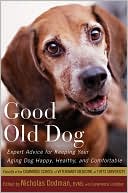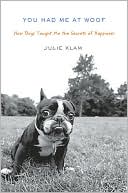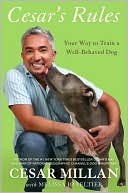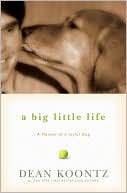Oh My Dog: How to Choose, Train, Groom, Nurture, Feed, and Care for Your New Best Friend
Owning a dog is one of life's great joys, but sometimes the challenges it brings can make even the most devoted dog lovers panic, throw up their hands, or feel completely overwhelmed. Before you get to the end of your leash, turn to this friendly and relatable reference that's the next best thing to talking to a dog-owning friend who's seen it all.\ In Oh My Dog, animal rights activist Beth Ostrosky Stern has compiled tips and invaluable advice from experts-and from her own experiences as a...
Search in google:
Calling the toughest canine questions! Owning a dog is one of life’s great joys, but sometimes the challenges it brings can make even the most devoted dog lovers panic, throw up their hands, or feel completely overwhelmed. Before you get to the end of your leash, turn to this friendly and relatable reference that’s the next best thing to talking to a dog-owning friend who's seen it all. In Oh My Dog, animal rights activist Beth Ostrosky Stern has compiled tips and invaluable advice from experts—and from her own experience as dogowner—to sooth concerns, answer questions big and small, and help you and your dog get the most out of your relationship. From the moment you even consider getting a dog, to caring for your old friend when his puppy years are far behind him, Oh My Dog covers every angle of dog ownership, including: - Which breeds would be good match for me? - What do I look for in a vet? - How do I make sure our first night together is as stress-free as possible? - What activities will help me bond with my dog?- Is my dog showing sign of illness?- What should I know before I head to a doggie day care or park? - How do I read pet food labels? - What should I do in an emergency?Choc full of informative side bars, questionnaires, to-do lists, and much, much more, Oh My Dog is the answer-filled field guide for anybody who owns a dog or is considering getting one. Beth Ostrosky Stern Library Journal Stern, North Shore Animal League America spokesperson and Long Island Bulldog Rescue member (and wife of radio personality Howard Stern), has written a comprehensive guide to dog ownership. Every aspect of companion animal care is covered, beginning with selecting a purebred puppy from a breeder or an older dog from a shelter and concluding with end-of-life considerations. Training, behavior, grooming, bonding, health maintenance, and nutrition are explained in minute detail. Stern's chatty tone and language can be easily understood by inexperienced owners. She is not a veterinarian, behaviorist, trainer, or groomer, but her passion for dogs has led her to amass a great deal of knowledge, and she draws on and cites her extensive network of experts to validate her assertions. VERDICT An excellent resource for patrons that complements Ian Dunbar's Before & After Getting Your Puppy and Kristin Mehus-Roe's The Original Dog Bible. Highly recommended. [For more dog-training guides, see Kristine Alpi's Short Takes, LJ 4/15/10, p. 101.—Ed.]—Florence Scarinci, Nassau Community Coll. Lib., Garden City, NY
Oh My Dog\ \ By Beth Ostrosky Stern \ Gallery\ Copyright © 2010 Beth Ostrovsky Stern\ All right reserved.\ ISBN: 978-1-4391-6029-9 \ \ \ Chapter One\ 1 So You Want a Dog? \ I'm really excited for you! According to the Humane Society of the United States, there are 74.8 million dogs owned in the U.S.-and you may be about to boost that number. Dogs can be affectionate, loyal, spunky, and respectful companions. Some make great exercise buddies, while others offer an endless source of affection. Come to think of it, dogs can be any jumble of qualities based on their background and breed, so the trick to finding one that's right for you is being able to combine research with instinct and a whole lot of love. When deciding on what kind of dog is best for your home, you'll need to think hard about what makes you tick and the canine qualities that are the right fit for your lifestyle. And remember: This is a commitment that you'll be making for approximately fifteen years. Then again, the oldest dog on record lived to be twenty-nine, so you may want to plan for a bit longer ...\ Before you even get a dog, it's important to know exactly what you want from the pet and what you hope to get from your relationship with him. So in this chapter, I'll help you figure out your best canine match by suggesting specific ways to emotionally and mentally prepare for the new relationship. I'll take you through questions like: What are the benefits of full-grown dogs versus puppies? How active would you like your dog to be? Is anyone in your home allergic to dogs, and if so, what breeds lend themselves to hypoallergenic traits? I'll also go into the best and worst places for you to get a dog. Never forget that owning a pet requires an open mind and a welcoming heart. So let's get to it. You have some reading to do!\ Where Do Dogs Come From?\ According to Mary Burch, PhD, CAAB, an animal behaviorist with the American Kennel Club (AKC), the dogs that we know and love today are called Canis lupus familiaris to the researchers who study them. In fact, "lupus" is the word that indicates that dogs are connected to the ancestral wolf (though some dogs, like Shih Tzus, look more like descendents of the Muppet). Science tells us that dogs evolved from a group of domesticated wolves in East Asia about fifteen thousand years ago, with earlier ancestors documented as far back as forty thousand years. Through selective breeding for specific characteristics, modern dogs have evolved over the last five hundred years.\ It took a long time to create the 160-plus breeds that the AKC recognizes today. If an owner had a large brown-and-white dog and wanted a smaller version, he'd breed the smallest female in that litter to the smallest male he could find. He would continue breeding smaller and smaller dogs until he actually created a mini-version of the dog he started with generations earlier. So, from the 180-pound Mastiff to the 2-pound Chihuahua, all breeds came from a common ancestor-including mixed breeds, an even more colorful variation on the domesticated-dog theme. How interesting is that?\ Studies Show How Dogs Can Improve Your Life\ When people talk about why they want a dog, they usually cite emotional benefits: company, love, a way to add a little fun to their current lifestyle. Dogs are thrilled to see you after a long day, they always want to hang out with you, and their positive spirit rarely fails to make you smile. But studies tell us that dogs add so much more to your life than games of fetch and slobbery kisses. In fact, dogs can benefit your physical and psychological health, in some cases even more so than human relationships. I've combed through a bunch of dog studies and found a few interesting perks that you can look forward to:\ DOGS DECREASE STRESS\ Dog owners have lower blood pressure, a slower heartbeat, and more relaxed muscles. It can take days or weeks before you benefit from meds, yet with only five to twenty-four minutes of petting or simply being in the moment with their pet, owners can relieve stress.\ Dog owners live longer, since they deal with anxiety better and fight depression easier.\ Dog owners have lower cholesterol and triglycerides and are at less risk of developing heart disease and other cardiovascular problems. These positive effects continue even when you're away from your dog.\ Heart attack victims have a higher survival rate when they spend time with a dog. They may feel a need to recover quickly so they can care for the pet, who then buffers them from future stress.\ Dog owners walk about 300 minutes per week compared with nondog owners, who exercise an average of 168 minutes per week. Dog walking lowers stress more than walking alone.\ DOGS HELP PREVENT DISEASES\ Dogs help slash the risk of many terminal illnesses, plus slow down the disease's progression.\ Dogs can sniff out disease long before a high-tech machine or blood test, thanks to the body's chemical cues. A dog's sense of smell is up to a hundred thousand times times more sensitive than a human's.\ Dogs can also detect certain health issues in humans and alert their owners to the illness's onset through various behavioral cues. These conditions include changes in blood sugar and blood pressure, melanoma, migraine headaches, and heart attacks.\ Household dogs can be trained to detect early breast and lung cancer between 88 percent and 97 percent of the time by sniffing a human's breath. Dogs can also smell ketones on the breath and in the urine of diabetics when blood sugar is high; they detect this smell when glucose levels drop.\ Seniors who own dogs make fewer visits to the doctor and are more physically active. Pet owners over age sixty-five make almost a third fewer visits to their general practitioner than those who don't have pets.\ Elderly dog owners are four times less likely to suffer from depression than those without dogs.\ DOGS CHASE AWAY LONELINESS\ Playing with a dog and holding his gaze can cause a hormone surge of oxytocin that makes you and the dog happier; it also reduces anxiety. The hormone is linked to friendship, infant care, bonding, and romantic love in humans; plus, it quiets stress, fights depression, and breeds trust. People who hold their dog's gaze for longer than two and a half minutes consider their relationship to be more satisfying than short-term gazers.\ Dogs, like humans, often look left toward the right side of human faces, since it exhibits emotions more accurately and intensely than the left. This behavior is called left-gaze bias, because the left side of the brain controls these displays of emotion. Some think dogs adapted this behavior during hundreds of years of domestication, in an effort to make sense of their owners' emotions. When we look into the eyes of a dog that trusts us, we feel less lonely because we see a creature that's trying equally hard to connect right back.\ Some dog owners can fondly discriminate between their pet's smell and that of a dog that isn't theirs. When blindfolded, study participants correctly identified the blanket on which their dog slept for three consecutive nights, when compared to stranger dogs of a similar sex, age, and breed. (Bianca's blanket would smell like fresh biscuits. I'd know her scent anywhere!)\ Nursing home residents feel less lonely after visiting with a dog alone, versus with other people.\ DOGS LOOK OUT FOR KIDS\ Studies show that kids who care for pets are more nurturing, empathetic, and socially competent; at school, they're more popular with peers.\ Children who live with dogs are less likely to develop animal-related allergies later in life and less likely to develop eczema, asthma, and allergies to dust and pollen. Five- to seven-year-old dog owners also have fewer sick days at school, since pets may help boost a child's immune system.\ Five- and six-year-olds are 50 percent less likely to be overweight or obese if they own a dog, compared to those of the same age who don't own one.\ Note\ Ask Dr. Z!\ What does it mean when my dog ...\ Q: Cocks his head when I talk to him?\ A: Dogs receive slightly different signals from each ear due to the separation between them. Cocking their heads may enable them to get the best "stereo" sound from all angles, so they can better understand what it is you're trying to tell or ask them.\ Stephen L. Zawistowski, Ph.D., CAAB, is a certified animal behaviorist and an executive vice president and science adviser for the ASPCA. Lucky for us, he also offered to answer every quirky dog behavior question I could think to throw at him. You'll find these questions, and his answers, in the "Ask Dr. Z!" boxes that are sprinkled throughout this book. Dr. Z's assessments are based on his expertise and experience. Remember that every dog is different, but I was thrilled to see how many of the explanations applied to Bianca and her friends.\ How to Emotionally Prepare for a Dog\ Of course, it's important to choose a dog based on your practical lifestyle: where you live, how active you are, if there are children in your home, and so on. And we'll devote time to these scenarios later in the chapter. But what most people don't do, and should do, is take a really good look at their emotional expectations to help inform their dog decision, too. A dog takes up space in your life and in your heart. You don't want to feel disappointed when the dog you've chosen for its convenient size and polished looks also acts aloof or stubborn.\ To that end, I asked Irene Deitch, Ph.D., a psychologist who works with pet owners, to outline what you should know about yourself before sharing your life with a dog:\ Recognize your own emotional needs. Are you a bleeding heart? Looking for a patient and attentive confidant? Personally, I appreciate a little empathy in a dog. Last year I fell down the stairs while wearing a new pair of heels, and Bianca ran over and began to aggressively lick my left foot. Sure enough, that was the foot that was broken.\ Anticipate the dog's role in your life. Would you prefer unconditional love or an exercise partner? Are you controlling or relaxed? If you've just left your parents' home, are an empty nester, or don't plan to have children, you may want to choose a dog that satisfies a need to nurture. If you'd like a status symbol to show off at parties or carry in your bag, an exotic breed may be the way to go.\ Be ready to share your expectations with a breeder or rescue facility. Acknowledge and welcome another person's role in helping you find a dog that's right for you. When the time comes, you'll need to openly volunteer your needs and wants, but realize that experts can help you choose a dog that suits your lifestyle and personality.\ Trust your instincts. In most relationships, we spend time with people before we decide what roles they'll play in our lives. But with dogs, most of us don't have this opportunity (unless you foster first), so let self-recognition fuel your research and decision. Being able to follow your own intuition is also really important when forging a rapport between you and your dog, so consider this prep work for bonding efforts down the road.\ Note\ Why Do People Look Like Their Dogs?\ How often do you see people who look or act like their dogs? I don't think many people would say Bianca resembles either Howard or me ... but then again, Howard does snore loudly, like Bianca, and some days I feel really chubby. No surprise, then, that Dr. Deitch says a lot of people subconsciously cozy up to animals that share related traits. She says the reason for this is no different than it is for couples who look alike or friends who share mannerisms. Like attracts like, and this creates an immediate and automatic comfort zone, even if we don't realize it at the time.\ Solving Seven Dog Debacles Before They Occur\ If you have any fears about what to expect as a dog owner, Dr. Deitch says it helps to feel that the problems you anticipate are realistic but manageable. I pulled a survey from PetPlace.com that asked users: "What's the worst thing about owning a dog?" Below are my top seven answers to those problems, using some help from Dr. Deitch. Use this list to resolve common issues before they happen to you. You'll have seven fewer worries to keep you up at night.\ 7. Pet Odors: "Dog smell" is a hindrance only to the very sensitive. Even then your nose will adjust, much like it does when you work in a place with a distinct smell, or get used to a roommate's perfume after you've moved in together. Remember the study about owners who recognize their dog's scent? They identify it fondly. But when your dog's isn't so positive, Dr. Deitch says practical sprays and DIY remedies are a simple solution. For accidents, I've personally had amazing success with Nature's Miracle pet stain and odor remover, which works quickly, and is easy to use. As with any odor, the secret is to remove the smell's source and not cover it up with a Glade PlugIn.\ 6. Aggression: This is a complex issue that's best resolved by a professional called in to specifically modify your dog's temperament (see "When to Hire a Trainer Versus a Behaviorist" on page 146 for more). But in general, Dr. Deitch wants you to realize that a dog's behavior is both nurture and nature; pit bulls, for instance, can be very gentle if they're properly trained and reared by a warm soul (chaining and physical punishment are never the solution, no matter how aggressive your dog is). If you detect hostile tendencies, behavior modification can be very effective. Dr. Deitch adds that you should be aware of dog aggression, but don't worry unless it becomes a setback-and know that most of the time, there is a practical solution that doesn't involve the pound.\ 5. Barking or Whining: Dr. Deitch says this may be more problematic in an apartment building than in a house, simply for noise reasons, but know that all dogs are territorial-and barking when a dog hears a noise or someone at the door is normal. Of course, stopping when you ask him to stop is also expected. When you eventually meet with the adoption counselors at shelters or breeders, ask them which dogs are more prone to barking than others and what situations might provoke this (some dogs bark at birds, others at the TV). If you find that your dog is barking for food or attention, or if barking accompanies separation anxiety or aggression, a trainer can help you resolve it. Eventually, you'll learn to understand what your dog's barks mean without help. (See "Listening to Your Dog" on page 139 for more on how to decode barks, whines, and howls once he's in your care.)\ 4. Potty Mistakes: If he's not already housebroken, you'll need to housebreak your dog shortly after you bring him home. Creating a regimented potty schedule will help this process. Dr. Deitch says dogs can make potty mistakes for any number of reasons, but once you get to the root of the problem, it's rarely a situation that can't be resolved.\ 3. Cost of Medical Care: If you're nervous about money matters, start by taking two initial precautions: 1) save for your dog and 2) buy pet insurance. Dr. Deitch says singles and couples without kids may be more liquid and may not need to make changes to their budget, but if your dog is part of a more financially taxed unit, you may want to save. See the box on "How Will I Deal with Time and Cost Concerns?" on page 18 for more on this.\ 2. Pet Hair: Dr. Deitch suggests researching hypoallergenic dogs if you're concerned about allergies. (President Obama, for instance, chose a Portuguese Water Dog because one of his daughters is allergic.) If you're worried about a hairy mess, you should look for low-shedding dogs. Note that hypoallergenic dogs and low-shedding dogs are not the same. See "What You Should Know About Hypoallergenic Dogs" on page 34 for more.\ 1. Boarding or Finding a Sitter: In my experience, this is a problem only if you wait till the last minute to find a dog sitter or an open kennel. Instead, Dr. Deitch recommends designating a few pet sitters before you even bring a dog home. Beyond professional facilities, I've found that responsible teens are game for dog sitting, as are friends from out of town who don't mind watching a dog in exchange for an informal "vacation" at your house. Some dog walkers are associated with boarding facilities, too, and will fill in, in a pinch. For more on this topic, see "Collect Your Contacts Before You Need to Use Them" on page 67.\ Note\ How Will You Deal with Time and Cost Concerns?\ Dr. Deitch says the two most typical concerns that her clients discuss with her before getting a dog are related to time and expenses. She adds that the best way to handle your angst is to tackle the problems logistically. The therapist's take on both:\ (Continues...)\ \ \ \ \ Excerpted from Oh My Dog by Beth Ostrosky Stern Copyright © 2010 by Beth Ostrovsky Stern. Excerpted by permission.\ All rights reserved. No part of this excerpt may be reproduced or reprinted without permission in writing from the publisher.\ Excerpts are provided by Dial-A-Book Inc. solely for the personal use of visitors to this web site. \ \
Introduction: The Best Kind of Pet Project 11 So You Want a Dog? 72 You're Getting a Dog? 553 Training and Behavior 1014 Health 1775 Nutrition 2556 Grooming 3177 The Bond 3718 Emergencies, First Aid, and Saying Goodbye 429All About My Dog! 479Afterword: Now put Down the Book, and Go Love Your Dog! 483Acknowledgments 484Index 487
\ From Barnes & NobleBeth Ostrosky Stern's Oh My Dog is not just one of those fun reads tossed off by a celebrity about his or her adorable pet. Instead, this TV personality and animal-rights activist has crafted a truly comprehensive, user-friendly guide for anyone owning or planning to own a dog. The book addresses all the hot-button issues that any canine-lover will confront. The topics include finding the perfect breed for your lifestyle; adopting a pet; dealing with a puppy's fear of a new place; choosing the right vet; dog park etiquette; safety tips for traveling; safe doggie diets and supplements; developing a bond with your pet; and health issues.\ \ \ \ \ \ From the Publisher"Whether you're an experienced pet parent, trying to decide on the type of dog you want, or you simply love animals, this book is a must-have. It is packed with practical information and a wonderful resource."\ — Joanne Yohannan, Senior Vice President, Operations, North Shore Animal League America\ \ \ \ Library JournalStern, North Shore Animal League America spokesperson and Long Island Bulldog Rescue member (and wife of radio personality Howard Stern), has written a comprehensive guide to dog ownership. Every aspect of companion animal care is covered, beginning with selecting a purebred puppy from a breeder or an older dog from a shelter and concluding with end-of-life considerations. Training, behavior, grooming, bonding, health maintenance, and nutrition are explained in minute detail. Stern's chatty tone and language can be easily understood by inexperienced owners. She is not a veterinarian, behaviorist, trainer, or groomer, but her passion for dogs has led her to amass a great deal of knowledge, and she draws on and cites her extensive network of experts to validate her assertions. VERDICT An excellent resource for patrons that complements Ian Dunbar's Before & After Getting Your Puppy and Kristin Mehus-Roe's The Original Dog Bible. Highly recommended. [For more dog-training guides, see Kristine Alpi's Short Takes, LJ 4/15/10, p. 101.—Ed.]—Florence Scarinci, Nassau Community Coll. Lib., Garden City, NY\ \








